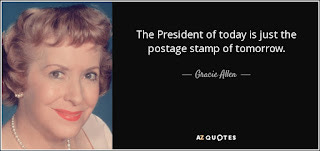That Time When Gracie Allen “Ran” For President
The 1940 presidential campaign was turned upside down when the radio star threw her hat into the ring—sort of.
Gracie Allen was one half of a comedy duo with her husband, George Burns. She was the ditzy one to Burns’ straight man. Their career spanned vaudeville, radio, TV and film for over thirty years.
In 1940, their popularity hit a peak when they engaged in an unusual stunt: Allen ran for president.
Gracie Allen: smart at playing dumb
Allen, a San Francisco native, entered show biz at the age of three. By the turn of the century, she and her three sisters formed an Irish dancing act. She performed in vaudeville with them, and later, did comedy with her sister Bessie.
In 1922, Burns split with his partner Billy Lorraine. Despite being advised to join the latter, Allen joined the former.
In the beginning, Allen was the straight man and Burns had the punch lines. When audiences laughed harder at Allen, Burns switched their roles, emphasizing Allen’s dingbat persona.
They married on-stage, at Cleveland’s Palace Theater in 1926, though their marriage wasn’t officially part of their routine until 1941. Later they adopted two children, Sandra and Ronald.
They also appeared in film and TV, but they were radio stars from 1929-50. After debuting in London on the BBC, their regular appearances began three years later. On American radio, they continued their vaudeville routine. They bounced back and forth between NBC and CBS.
Gracie for president?
In 1933, Burns & Allen ran a storyline in which they looked for Allen’s missing brother. They’d pop up unannounced on other radio shows to carry on the “search.” Allen’s real brother didn’t like the routine, though. He asked them to stop.
Their next storyline was more successful.
In 1940, their show’s sponsor was Hinds Honey and Almond Cream, a skin care product out of Maine.
Burns and his writers kicked around ideas about what to do with Allen next. Someone suggested making her a politician; Burns opted for making her president.
1940’s presidential ra-cie
In 1940, incumbent president Franklin Roosevelt ran against Republican Wendell Willkie.
The Great Depression was ending, but the specter of world war loomed in Europe. This enticed Roosevelt to break with tradition and seek a third term in office. Willkie supported aid to the Allies against the Axis powers, but wasn’t willing to outright declare war.
The possibility of involvement in the war was a great concern. The vocal America First movement advocated staying out of it. Roosevelt promised he’d keep America out if reelected.
The country needed a laugh. Burns & Allen provided it with Allen’s “campaign.”
Gracie’s “campaign”
Allen kicked off her campaign in February. She had no running mate for vice-president, not even Burns, because she didn’t want to promote vice.
Her campaign was extensive:
Her party was the Surprise Party.
She released a book (probably written with the help of Burns & Allen’s gag writers).
First Lady Eleanor Roosevelt invited her to a women’s convention.
Allen even went on a thirty-four city whistle-stop train tour.
Burns was the doubting Thomas, befuddled at the very concept of Allen for president (and who could blame him?). Their radio show supporting cast—Bubbles Kelly, singer Frank Parker, announcer Truman Bradley and music conductor Ray Noble—were promised cabinet positions.
Allen did well in Wisconsin, relatively speaking.
Gracie does Omaha
While in Washington, Allen announced the Surprise Party’s first convention: in Omaha, Nebraska May 15-18, where they “nominated” her.
This was the same time as the city’s second Golden Spike Days, a celebration of the joining of the rails to make America’s first transcontinental railroad. Started the previous year, 1939, the event coincided with the premiere of the film Union Pacific, which depicted the moment.
According to a local Nebraska newspaper, The Beatrice Daily Sun, thousands greeted Burns & Allen’s train dressed in period garb. Parades were thrown.
Gracie’s legacy
Needless to say, Allen lost. FDR defeated Willkie and led the U.S. into World War 2 after the attack on Pearl Harbor in 1941. She did get write-in votes, however.
Allen died in 1964. In 1975, the Alliance for Women in Media Foundation founded the Gracie Awards, honoring programming by, about and for women. In 1986 filmmaker James L. Brooks founded Gracie Films.
And of course, who can forget how the humpback whales named for George and Gracie helped save the world?
@byrichwatson
PLUS: Here’s a Washington Post review of a A&E documentary about Allen from 2002.
—————
Do you know someone who remembers Gracie Allen’s presidential “campaign”?



